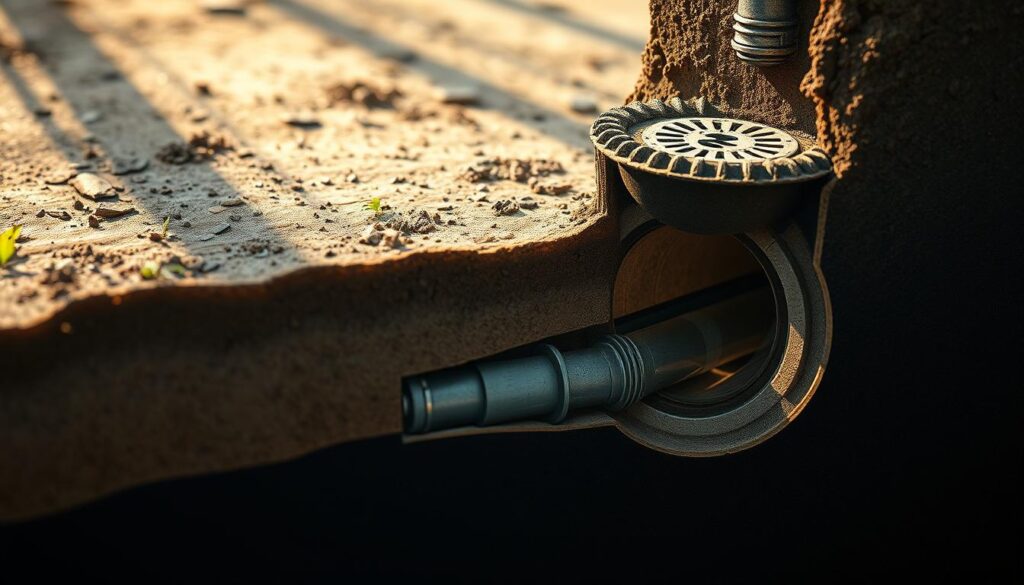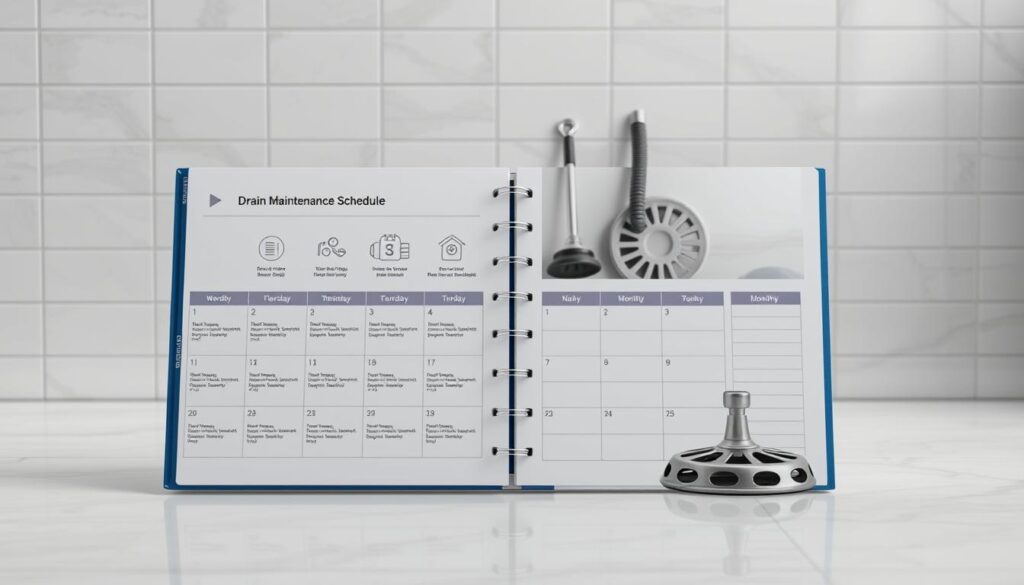We’ll show you a clear, practical plan that stops blockages before they start. If you want to protect your property from water damage, bad smells and slow sinks, this guide tells you what to do right now and why it works.
Small, regular checks keep your drainage system moving and cut the chance of costly repairs. We explain easy DIY steps for grates and the drain entry points, plus when to call a pro so hidden issues are caught early.
OnCall Emergency Plumbers are Melbourne-based and available 24/7 for general plumbing, blocked drains, burst pipes and leak fixes. We focus on rapid repairs, trusted materials and affordable services, and we’ll help match a routine to your site’s usage and needs.
Key Takeaways
- Simple, consistent care prevents common drainage problems.
- Annual professional cleaning suits most homes; busier sites need more attention.
- Quick DIY checks on grates and visible pipes save time and money.
- Keep brief records so future work is faster and less costly.
- Call OnCall Emergency Plumbers in Melbourne 24/7 on 1800 571 216 for urgent help or tailored advice.
Why a proactive drain maintenance schedule matters in Australia
A. Ignoring minor blockages can quickly turn into expensive water damage and disruption for Australian homes and businesses.
QBE data shows burst or blocked pipes cause 46% of water damage claims; clogged pipes add another 13.4%. This illustrates how small issues escalate into structural damage and costly repairs.
Slow flow, recurring clogs and bad odours signal that cleaning is overdue. Left unchecked, these problems increase health risks from bacteria and mould, and they raise slip and sanitation hazards that interrupt daily operations.
- Australian weather and leaf fall increase the risk of blockages.
- High-use properties and older systems need more frequent attention to keep water moving away from buildings.
- Regular care saves time and prevents emergency call-outs and larger system failures.
We offer 24/7 response across Melbourne to reduce downtime and protect health and safety when systems fail. For professional service and tailored advice, see our drainage services or call 1800 571 216.
Understanding your drainage system before you plan
Before you set any tasks, it helps to see how gutters, downpipes and underground lines link across your property.

From surface channels to subsurface pipes, a complete drainage system includes gutters, downspouts, catch basins, graded slopes, grates, culverts and detention ponds. We map how surface and subsurface systems meet your internal pipe runs so you can spot where water should flow.
Common culprits by area
Kitchens collect grease and fibrous food that form clogs. Bathrooms trap hair and soap scum. Outdoors, leaves and sediment fill grates and open channels.
Seasonal factors that change risk
Australian heavy rain tests capacity, while autumn leaf fall can overwhelm grates. Cooler weather causes fats to harden in pipes and raises the chance of blockages and water damage.
- We explain how each component works together to reduce system strain.
- We point out higher-risk types—older lines, clay pipes or root-prone sections.
- We recommend annual stormwater clearing, and more frequent attention where trees or pooling occur.
We can map your specific systems and advise the right approach for each area of your property. Call OnCall Emergency Plumbers on 1800 571 216 for tailored guidance.
How to build a maintenance schedule drains that actually works
A practical rhythm of checks and simple actions makes upkeep easy and effective for any property.

Set the cadence: weekly, monthly, quarterly and annual tasks
Keep weekly visual checks for grates and visible pipe access. These quick reviews catch early blockages and save time later.
Monthly checks focus on heavier-use areas such as kitchens and commercial lines. Quarterly work targets rooflines and outdoor channels.
We recommend annual or semi-annual inspections, with pre-winter and post-autumn checks to stop grease hardening and leaf build-up.
Match frequency to size, pipe age and usage
Tier work by property type: older piping or food-heavy kitchens need more frequent attention. Newer, low-use sites can test longer intervals.
Create reminders and records to stay on track
Log dates, findings and any small cleaning or repairs. Use calendar alerts and labels at access points so everyone follows the same way.
- Short daily or weekly wins keep the broader drainage system reliable.
- Targeted inspections save money by spotting potential issues early.
We can help design a practical plan and set reminders. Call OnCall Emergency Plumbers 24/7 on 1800 571 216 for tailored support.
DIY drain care tasks to prevent debris and clogs
Preventing clogs starts with simple, repeatable tasks you can do in minutes. We show easy steps that keep water moving and cut the chance of a small blockage becoming a bigger problem.
Simple routines to protect entry points
We recommend short, weekly checks to remove leaves and visible debris from grates and sink strainers. Fit fine mesh guards where hair and food enter the system.
Use hot water flushes and safe cleaners
Pouring a kettle of hot water through kitchen lines helps move fats and soap film. Repeat this a few times a month, especially in cooler weather when grease firms up.
At-home odour fixes that are pipe-safe
For minor odours, sprinkle baking soda, follow with a modest amount of vinegar, wait five minutes and rinse with hot water. The baking soda vinegar reaction clears smells without harsh chemicals.
- Quick wins: five-minute weekly checks to regularly clean grates and fit guards to prevent debris entering drains.
- After storms: clear leaves and sediment so water flows away from buildings and channels stay open.
- Warnings: avoid strong chemical cleaners — they can harm older pipes and the wider drainage system.
If odours persist, clogs recur or slow flow continues, our team can help. We offer 24/7 assistance across Melbourne with quality parts and affordable service — call OnCall Emergency Plumbers on 1800 571 216.
When to call the pros at OnCall Emergency Plumbers
Persistent slow flow, recurring clogs or strong odours point to issues beyond DIY fixes. We step in when small problems become signs of deeper blockages or pipe defects that risk water damage.
Signs you need professional help
Slow drain performance, repeated blockages and stubborn odours are clear red flags. If hot water flushes and simple cleaning don’t help, call a professional plumber.
Ideal professional timetable
We recommend annual cleaning for most homes and every 3–6 months for high-use sites such as cafes and commercial kitchens. This approach protects pipes and extends system lifespan while reducing costly repairs.
What we do on service
Our services include targeted CCTV inspections to find faults, precision hydro-jetting for deep cleaning, and durable parts from reputable brands for lasting repairs.
24/7 emergency response across Melbourne
We offer 24/7 services for blocked drains, burst pipes and leak fixes. Call us on 1800 571 216 and we’ll prioritise your property with the right solution at the right time.
Conclusion
A steady, simple routine protects your property from small blockages turning into big problems.
Use the practical tips here and pair short DIY cleaning with regular professional checks. This way you guard against debris build-up, seasonal leaf fall and winter grease that raise the risk of water damage and clogs.
Focus on surface controls — grates, gutters and drain guards — to keep debris out of your drainage lines and protect downstream system performance. Timely cleaning finds potential issues before they need costly repairs.
We’re ready 24/7 across Melbourne to help design a plan or act fast when urgent work is needed. For reliable, affordable service and expert repairs call OnCall Emergency Plumbers on 1800 571 216 or see our blocked drains Park Orchards page.
FAQ
Why is a proactive drain maintenance plan important in Australia?
A proactive approach reduces the chance of costly water damage, pipe corrosion and property claims. Regular care limits blockages that cause overflows, pest entry and foul odours. It also keeps insurance questions to a minimum and prolongs the lifespan of pipes and fixtures.
What are the real costs of clogged pipes and water damage?
Clogs can lead to slow drains, sewer backups and structural water damage that require expensive repairs, replacement of flooring or cabinetry, and potential mould remediation. Businesses may face downtime and lost revenue. Early intervention is far cheaper than reactive fixes.
How do neglected pipes affect health and comfort?
Blocked lines trap organic waste and start to smell, attracting vermin and increasing allergen and mould risk. That creates unhealthy indoor air and can force occupants to vacate until the problem is resolved.
How does a property’s drainage system work together?
Roof gutters, downpipes, stormwater drains, household waste lines and sewer connections all link to move water away from the building. A fault in one area, like a blocked gutter, can overload another, such as stormwater pits or sewer lines.
What typically causes blockages in different areas of a property?
Kitchens see grease, food scraps and fats; bathrooms collect hair, soap and personal-care products; outdoors, leaves, soil and garden debris build up. Older pipes can also trap sediment and scale, worsening flow over time.
How do seasonal factors in Australia affect clog risks?
Heavy rain can wash debris into pits and overwhelm stormwater lines, while autumn leaf fall blocks gutters. Colder periods encourage fats to congeal in pipes. Planning tasks around seasons reduces emergency calls after storms.
What regular tasks should we include in a practical upkeep plan?
Weekly clearing of strainers and grates, monthly hot-water flushes for kitchen sinks, quarterly gutter and external gutter-head checks, and an annual full inspection with CCTV for older properties. Tailor frequency to use and pipe condition.
How do we match inspection frequency to our property?
High-use sites such as restaurants need checks every 3–6 months. Residential properties often manage with annual professional reviews, plus simple monthly home checks. Age of piping and past problems should increase inspection cadence.
What tools help us stay on top of tasks and records?
Set digital reminders, keep a log of dates and work carried out, and store invoices and CCTV reports. That documentation helps with warranty issues and insurance claims, and ensures continuity across caretakers.
Which DIY routines help prevent debris and blockages?
Use drain guards, clear grates after storms, pour boiling water down kitchen sinks weekly to move fats, and remove visible leaf or soil build-up outside. These simple steps reduce the workload for professionals.
Is baking soda and vinegar safe for minor odours and blockages?
A measured mix of baking soda followed by vinegar can clear minor odours and loosen light organic grime. Avoid strong chemical drain cleaners — they can damage older pipes. For persistent or recurring issues, call a professional.
What signs indicate we should contact OnCall Emergency Plumbers?
Persistent slow drains, recurring clogs, sewage odours, gurgling noises, surface sinkage or any evidence of water damage mean it’s time to call us. Rapid action prevents escalation and reduces repair costs.
What is the ideal professional inspection schedule for different properties?
We recommend annual residential inspections for most homes, and 3–6 month cycles for high-use commercial kitchens or rental portfolios. Properties exposed to heavy tree cover or frequent storms may need more frequent attention.
What services do we provide during a professional visit?
Our technicians undertake CCTV inspections to locate blockages, hydro-jetting to clear pipes, targeted repairs with quality parts, and preventative advice. We document findings so owners have a clear action plan.
Do you offer emergency response across Melbourne?
Yes. We provide 24/7 emergency call-outs across metropolitan Melbourne. For urgent blockages, sewage issues or burst pipes, call our hotline on 1800 571 216 for prompt assistance.
